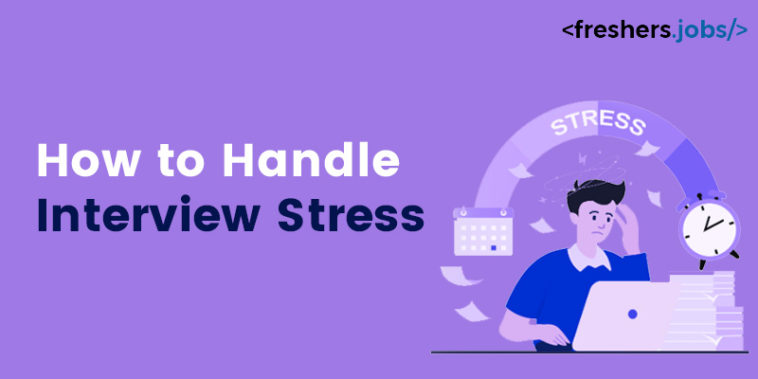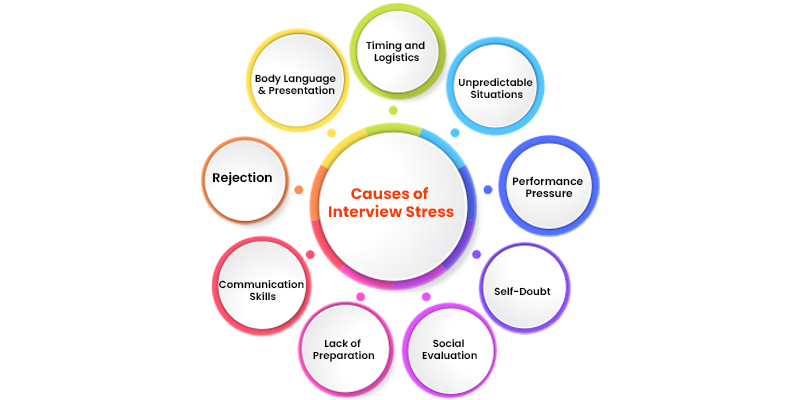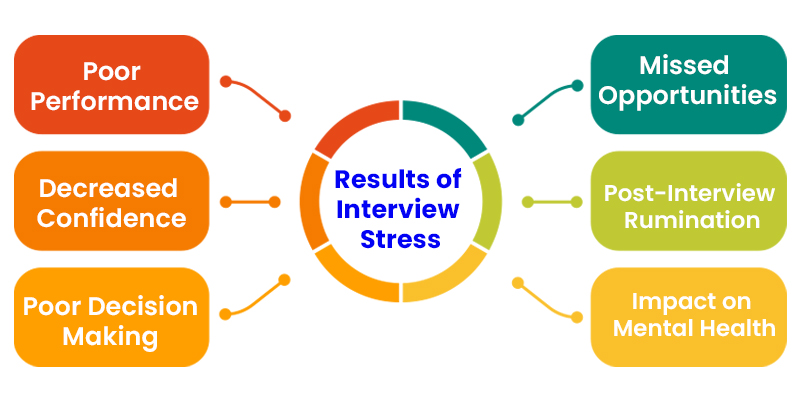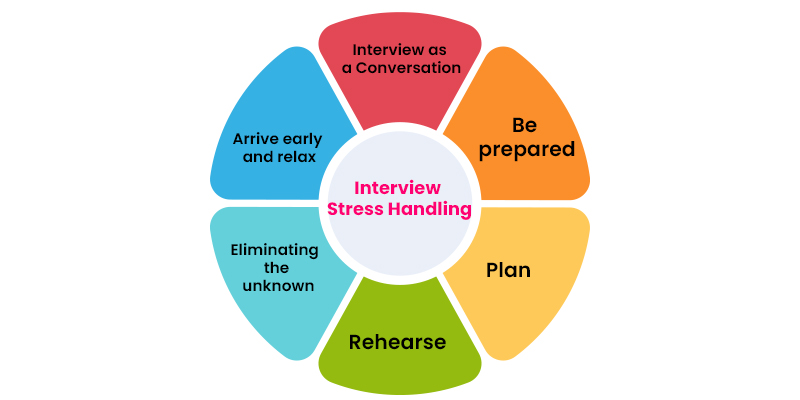The pressure to make a strong impression, answer questions confidently, and demonstrate your suitability for the role during a Job Interview can be challenging and lead to a high possibility of getting nervous at the time of the interview. It’s perfectly normal to feel interview stress, but the key is to know how to manage it effectively.
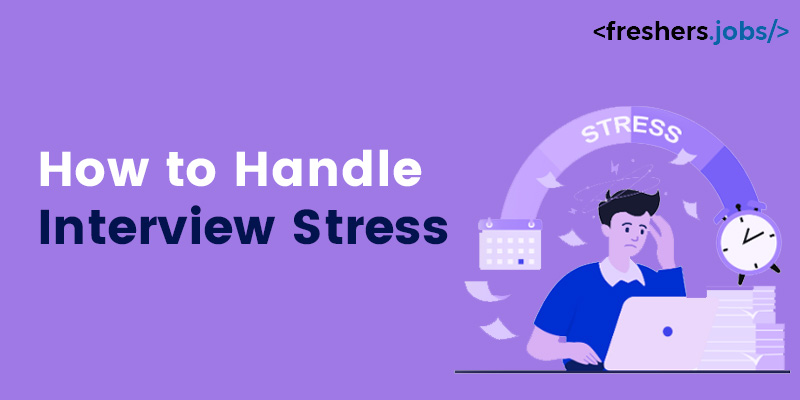
In this blog, we will explore how do you handle stress and pressure like a pro during an Interview. If you’re a recent graduate who is in search of freshers jobs, these tips will empower you to navigate the interview process with confidence. So, let’s dive in and discover how to turn interview stress into a stepping stone towards success.
What is Interview Stress?
Interview stress, also known as job interview anxiety or interview nerves, refers to the psychological and physiological responses that individuals experience when they are preparing for or participating in a job interview. It is a common reaction to the high-pressure and evaluative nature of job interviews. Interview stress is a natural response to a stressful situation where individuals are being evaluated for job opportunities during an Interview. However, excessive stress can hinder your performance and confidence during the interview. Therefore, it is important for job seekers to recognize and manage interview stress through various strategies such as preparation, relaxation techniques, positive self-talk, and seeking support from friends, family, or professionals to ensure they present themselves in the best possible way during the interview process.
Causes of Interview Stress
Interview stress, which is also known as interview anxiety or job interview nerves, is a common reaction that many people experience when they are preparing for or participating in a job interview. Several factors can contribute to interview stress:
- Fear of the Unpredictable Situations: Job interviews also involve unpredictable situation handling questions. Not knowing exactly what to expect can create anxiety.
- Performance Pressure: Candidates often feel pressure to perform well and make a positive impression on the interviewer. The desire to meet the expectations of the potential employer can be overwhelming.
- Self-Doubt: Individuals may doubt their qualifications, skills, or ability to handle the job, leading to self-doubt and anxiety.
- Social Evaluation: Interviews involve being evaluated by others, which can trigger anxiety for some people. The fear of judgment or rejection can be a source of stress.
- Lack of Preparation: Inadequate preparation, like less research about the company or inadequate preparation of answers to common interview questions, can increase anxiety.
- Communication Skills: If an individual struggles with poor communication skills, they may worry about not being able to convey their qualifications and experiences clearly, leading to stress.
- Body Language and Presentation: Concerns about how one appears, such as body language, attire, or grooming, can also be a source of stress.
- Timing and Logistics: Worrying about getting to the interview on time, finding the location, and dealing with unexpected delays can contribute to stress.
- Rejection: The fear of rejection or not receiving a job offer after investing time and effort into the interview process can be emotionally distressing.
To manage interview stress, individuals can employ various strategies, including thorough preparation, practicing interview questions, improving self-confidence, and adopting relaxation techniques. Recognizing and addressing the specific causes of stress can help individuals navigate interviews more effectively. Additionally, seeking support from friends, family, or professional career coaches can be beneficial in managing interview anxiety.
BYJU’S offers a wide range of job vacancies for freshers. Interested Candidates can click on Byju’s Jobs For Freshers to apply for various job roles relevant to their skills and abilities.
Results of Interview Stress
Interview stress can have various results and consequences, both during and after the interview process. Here are some common outcomes of interview stress and lack of pressure handling skills:
- Poor Performance: High level of stress can negatively impact your performance during the interview. It may lead to difficulty in articulating thoughts, memory lapses, and nervous body language, which can affect your chances of success.
- Decreased Confidence: Interview stress can decrease your self-confidence. Repeated negative thoughts and self-doubt may affect the candidate even after the interview is over.
- Poor Decision-Making: Stress can impair your ability to make sound decisions, both during and after the interview. You may second-guess your responses and choices made during the interview.
- Missed Opportunities: Overwhelming stress may lead you to miss valuable opportunities during the interview. You might overlook certain questions or fail to ask important questions about the role or company.
- Post-Interview Rumination: After the interview, you may find yourself replaying the conversation and analyzing every detail, which can increase anxiety and stress.
- Impact on Mental Health: For some individuals, interview stress can increase existing mental health issues or lead to the development of anxiety or depression.
It’s important to recognize the potential consequences of interview stress and take steps to manage and reduce it. Effective stress management techniques, such as relaxation techniques or seeking support from friends or professional networks, can help you navigate interviews more successfully and cope with the pressure handling. Remember that interview stress is common, and with practice and self-care, it can be managed to improve your overall interview performance and well-being.
If you are in search of job opportunities in Hyderabad, you can look for job openings available in that city. Visit fresher job openings in Hyderabad to find job positions that are relevant to your skills and abilities.
How to Overcome Interview Stress
Remember that interview stress is normal. By adopting some strategies and practicing them regularly, it is very easy to reduce the impact of anxiety and increase your chances of performing well in interviews. Handling interview stress is essential to perform your best during job interviews. Here are some effective strategies to manage and reduce interview stress:
- Be prepared: One of the most valuable pieces of advice for students or job seekers is the importance of conducting thorough research. It is essential to invest time in learning about the organization you’re applying to, including its products, services, and even its competitors. This knowledge is empowering because the more you understand, the more confident and prepared you’ll be when responding to interview questions. Comprehensive interview preparation is key to being calm and confident during an interview. This includes researching not only the company but also the industry it operates. Make a list of questions you’d like to ask the interviewer, practice your responses to expected interview questions either on your own or with a friend or family member who can provide constructive feedback. Additionally, note down three to five key points that you want the interviewer to remember about you by the end of the interview. This will help you to respond effectively. Employers are not only looking for candidates who can perform the job; they’re also interested in candidates who are a good fit for the organization as a whole. Familiarize yourself with the company’s mission statement and consider how the position you’re applying for aligns with and contributes to the company’s broader mission and goals. This perspective can enhance your interview responses and demonstrate your genuine interest in the company.
- Plan: Part of effective preparation involves taking steps in advance for pressure handling on the day of the interview. The more you can plan and organize beforehand, the smoother the entire process will be. For instance, it’s a good idea to concentrate on interview grooming by laying out your interview attire and ironing your clothes the day before. This way, you avoid the last-minute panic of discovering a significant stain on your dress just an hour before the interview. Punctuality is essential, as nothing can stress you more than rushing or being late to the interview. Additionally, ensure you get a good night’s sleep the night before the interview. A well-rested mind and body will help you stay focused, composed, and give the best response during this critical event.
- Rehearse: Instead of trying to memorize exact answers to expected interview questions, it’s advisable to create outlines of key points you want to convey. Delve into the message you aim to communicate. Sometimes, memorizing answers for the interviews can lead to inadequate preparation, which can increase nervousness. Much like any skill, the more you practice, the more proficient you become. If you tend to experience a trembling voice when nervous, engaging in mock interviews can significantly boost your confidence and help you with pressure handling. If conducting practice interviews with others is not possible, consider rehearsing in front of a mirror. Pay particular attention to your posture, facial expressions, and maintaining eye contact. These actions can contribute to a more polished and self-assured interview performance.
- Eliminating the unknown: Numerous factors can contribute to pre-interview stress, so it’s wise to minimize these factors whenever feasible. For instance, if you’re uncertain about the appropriate attire for the interview, opt for formal clothing since it is a safe option. This proactive approach can help handle any uncertainties regarding your interview preparation.
- Arrive early and relax: Upon your arrival at the interview location, it’s advisable to allocate enough time to remain in your vehicle, gather your thoughts, take deep breaths, and regain your composure. It’s essential to remind yourself that this is essentially a conversation aimed at assessing compatibility between both you and the prospective employer and helping you with pressure handling.
- Think of the interview as a conversation: Although it can be challenging, refrain from framing it as a conventional job interview. Instead, view it as a conversation involving two individuals aiming to establish a mutual understanding and determine if they can effectively collaborate in a professional capacity.
In conclusion, stress during an interview is common. With practice and some relaxation techniques, it is very easy to ace your interview and land your dream job. So, in this blog, we explored what interview stress is, how do you handle stress and pressure during an Interview, its causes, and the results of stress during an Interview.

